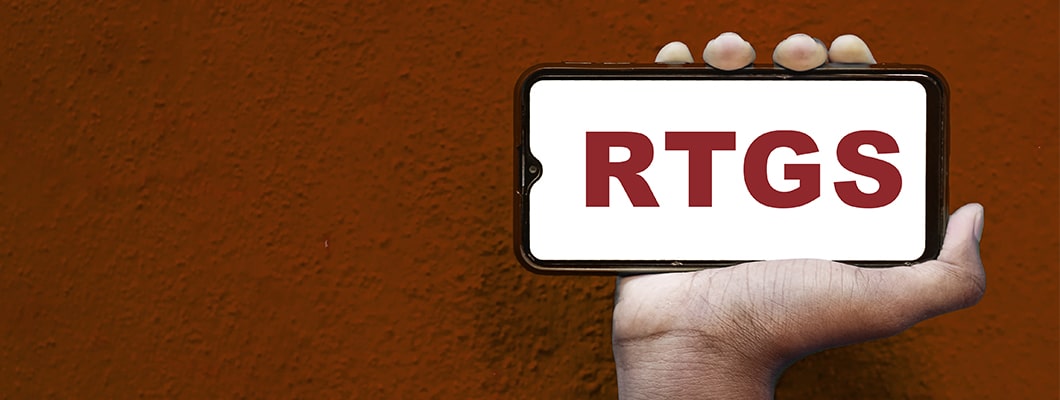
Understanding RTGS and Its Importance in Banking
Posted on Monday, May 20th, 2024 | By IndusInd Bank
The need for a secure and efficient payment settlement mechanism in India led to the introduction of real-time settlement – RTGS. This fund transfer option has become a cornerstone of modern banking over time. RTGS system helps to facilitate time-sensitive, large-value payments instantaneously.
The full form of RTGS is Real-Time Gross Settlement. It is a system that settles transactions individually on a real-time basis. In the full form of RTGS, ‘Real-Time’ refers to the instant processing of instruction at the time it is received, and ‘Gross Settlement’ refers to the processing and settlement of transfer transactions individually. RTGS transactions are irrevocable and irreversible (final) in nature.
What are the Key Features of the RTGS System?
- Security: The RTGS system ensures the confidentiality of financial information by employing robust safety measures. It protects the transaction from unauthorised access and financial fraud.
- Real-time settlement: Instant settlement ensures speedy and real-time funds settlement on a transaction-to-transaction basis.
- Certainty: RTGS transactions are final and irrevocable, which provides certainty to both the remitter and the beneficiary.
- Large-value transactions: The RTGS system enables large-value fund transfers. There is no maximum ceiling on the transfer amount.
- Minimised counterparty risk: RTGS minimises the risk of default by counterparties by settling transactions on a gross basis instantly.
- Nominal fees: No processing fee is levied on the RTGS transactions by the Reserve Bank of India. However, there is only a nominal service fee levied on outward RTGS transactions, depending on the transfer amount.
- Legal backing: The RTGS system has strong legal backing as it is owned and operated by the Reserve Bank of India. The RBI ensures safety, efficiency, and stability in the financial system by subjecting every RTGS transaction to comply with regulatory standards.
How Does Real Time Gross Settlement Work?
The RTGS in India contributes to the smooth functioning of the financial system with a secure, reliable, and efficient settlement of transactions. Its working involves:
Initiation of Transaction:
RTGS gets triggered when the sender initiates the transactions by instructing the bank to transfer funds to the beneficiary account with another bank. The transaction can be initiated through various modes – using the Bank’s mobile application, internet banking, or through branches.
Verification of Availability of Funds:
The originating customer’s bank verifies the availability of funds for transfer to the beneficiary’s bank account.
- Transaction authorisation:
If the mentioned amount of funds is available in the sender’s bank account, the originating customer’s bank authorises the transaction. The bank transmits the payment instructions to the RTGS system.
- Notification to the beneficiary bank:
The beneficiary customer’s bank receives the notification of funds credit by the RBI.
- Credit to the beneficiary account:
The beneficiary customer’s bank credits the funds to the beneficiary/receiver’s bank account for use.
Once the RTGS transaction is completed, both the sender and the beneficiary receive confirmation from their respective banks. Banks also maintain a record of the transactions.
FAQs:
How does RTGS differ from other payment systems?
Real-Time Gross Settlement (RTGS), National Electronic Funds Transfer (NEFT), and Immediate Payment Service (IMPS) are the three predominant payment systems in India. Here are the key differences:
| Base parameters | RTGS | NEFT | IMPS |
| Owned and operated by | RBI | RBI | NPCI |
| Settlement type | Real-time | In batches | Real-time |
| Transfer value limits (Min-Max) | ₹2 lakhs to no limit | No limits | Up to ₹ 5 lakhs |
| Mode | Online and offline | Online and offline | Online |
What are the benefits of using RTGS for fund transfers?
Here are some crucial benefits of using RTGS for fund transfer:
- Speed and security.
- Accommodates large value transactions efficiently with no upper limit.
- =Availability of RTGS facility on a 24X7X365 basis improves efficiency.
- Minimises counterparties risk
- Legal backing.
Is there a minimum or maximum transfer limit for RTGS transactions?
Yes. RTGS transactions can be initiated for a minimum value of ₹ 2 lakhs but no upper ceiling.
How long does it take for an RTGS transaction to be processed?
Typically, RTGS transactions are processed on a real-time basis and the beneficiary bank receives the funds as soon as the remitting bank initiates the transfer of funds. The beneficiary bank must credit the transferred funds to the beneficiary account within 30 minutes of its receipt.
Are there any fees associated with RTGS transfers?
There are nominal fees associated with RTGS transfers. Though RBI has waived the processing charges levied on the RTGS transaction, it has also rationalised the service charges levied by the banks for the same. Here are the details:
| RTGS Inward | Free |
| RTGS Outward | ₹ 2 lakhs to ₹ 5 Lakhs – Not more than ₹ 25 (excluding tax, if any) ₹ 5 Lakhs and above – Not more than ₹ 50 (excluding tax, if any) |
The RTGS service fees may differ depending on the type of your IndusInd Bank Savings account/IndusInd Bank Current account.
Also read: Real Time Gross Settlement (RTGS)
Can individuals use RTGS for fund transfers, or is it only for businesses?
Both individuals and businesses can use RTGS for fund transfer, provided the sending and receiving bank branch is RTGS enabled.
How secure is the RTGS system?
RTGS system is highly secure as it is regulated and operated by the RBI, ensuring strong encryption, authentication, and data protection.
What information do I need to provide to initiate an RTGS transfer?
You need to furnish the following important information to initiate RTGS transfer:
- Amount to be transferred
- Debit account number
- Details of the beneficiary bank (Bank name, branch, and IFSC code of the branch)
- Details of beneficiary (Name and account number)
- Sender to receiver information, if any
- Sender to beneficiary legal entity identifier (for eligible transactions).
- Sometimes the source of funds might also need to be declared.
Are there any specific operating hours for RTGS transactions?
RTGS system operates on a 24/7 basis throughout the year.
Can I cancel or reverse an RTGS transaction once it has been initiated?
No. You cannot cancel or reverse an RTGS transaction once it has been initiated. Real-time gross settlement transactions are irrevocable and final.
Are there any restrictions on the types of accounts that can initiate RTGS transfers?
Typically, RTGS transactions can be initiated using IndusInd Bank accounts or IndusInd Bank current accounts of individuals or businesses. However, funds held in IndusInd Bank fixed deposits cannot be directly transferred using the RTGS system. Time-bound investments like IndusInd Bank fixed deposit accounts cannot initiate real-time gross settlement of funds.
Also read: Payment NEFT/RTGS/IMPS Facility
What happens if there’s an error in an RTGS transfer?
In such a case, the RTGS member bank returns the funds received by it to the originating bank within an hour of receipt. The originating bank intern credits the sender’s account. Customers can also contact their bank or approach RTGS help desks at the RBI.
Are there any specific requirements for banks or financial institutions to participate in the RTGS system?
Banks or financial institutions must adhere to the RBI’s eligibility criteria to participate in the RTGS system. This includes maintaining a settlement account with the RBI and being a member of RBI’s payment system.
Is RTGS available internationally, or is it limited to domestic transfers?
No. RTGS in India is limited to domestic transfers only.
In summary, RTGS is a faster, more secure, reliable, and efficient system for transferring funds in India. It plays a crucial role in the ever-evolving Indian financial landscape by offering various benefits to businesses, individuals, and financial institutions. RTGS is an efficient payment system that contributes to financial inclusion, and economic development of the country.
Disclaimer: The information provided in this article is generic in nature and for informational purposes only. It is not a substitute for specific advice in your own circumstances. Hence, you are advised to consult your financial advisor before making any financial decision. IndusInd Bank Limited (IBL) does not influence the views of the author in any way. IBL and the author shall not be responsible for any direct/indirect loss or liability incurred by the reader for making any financial decisions based on the contents and information.



 Offers
Offers Rates
Rates Debit Card Related
Debit Card Related Credit Card Related
Credit Card Related Manage Mandate(s)
Manage Mandate(s) Get Mini Statement
Get Mini Statement
 categories
categories Bloggers
Bloggers Blog collection
Blog collection Press Release
Press Release

